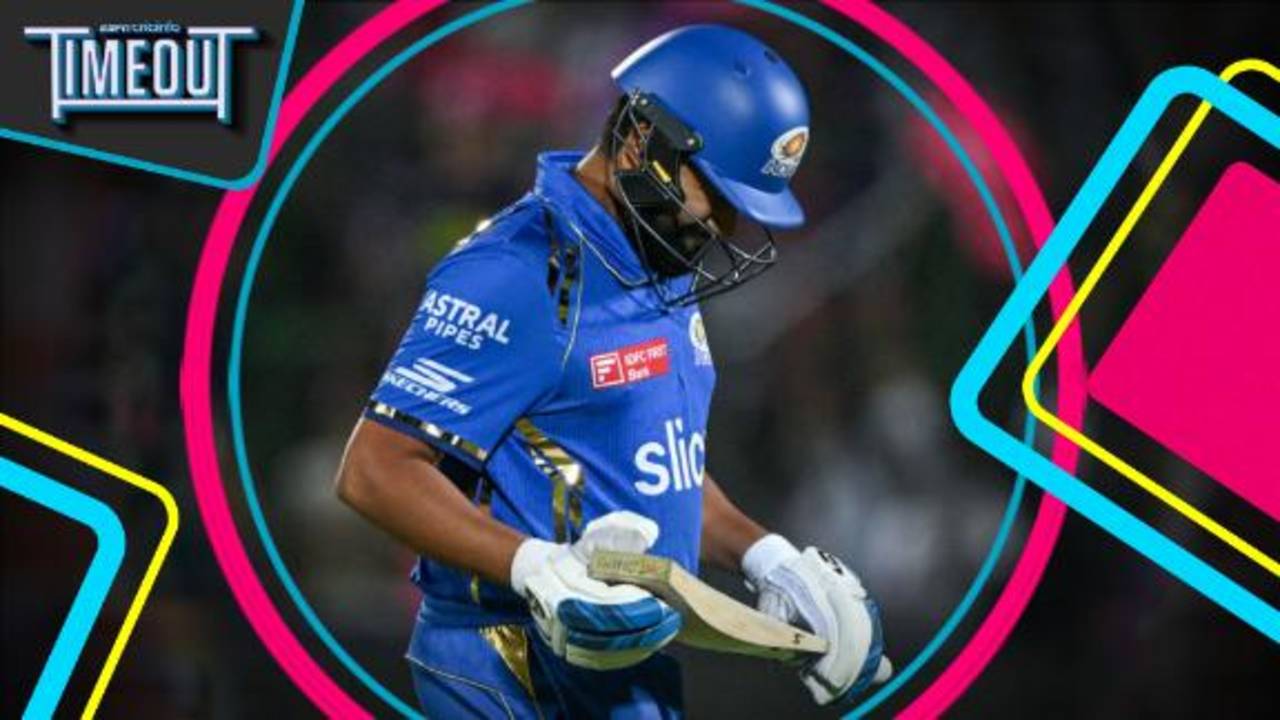How the mighty Mumbai Indians fell apart
There is no obvious reason but a collective dip in form has left the five-time champions on the brink of elimination
Andrew Fidel Fernando
01-May-2024
Ten matches in now, almost no hope of making the playoffs, there is a sadness to watching one of the great IPL franchises take their sorry show around India.
And we know roughly what is going wrong, or at least where the major flaws lie. They have lost 19 wickets in the powerplay this season, which is the second-worst in the league (after Delhi Capitals, who have lost 21). Their top five have scored quickly enough but have fallen too cheaply - their collective average of 29.10 is better only than that of Gujarat Titans and Punjab Kings who, like them, are haunting the bottom half of the points table.
On the bowling front, they have been woeful in the middle overs (between overs 7 and 16), where Bumrah typically bowls the least. They have conceded 60 sixes in that phase, and travelled at an economy of 10.21 (Chennai Super Kings have an economy rate of 7.67 in that phase). They have been especially weak on the spin front. Their top slow bowler, Piyush Chawla, has four wickets in seven outings, and has conceded runs at 9.85 an over. Mohammad Nabi has been marginally cheaper, but less penetrative, taking only two wickets in six bowling innings.
There is no obvious reason why besides Bumrah and perhaps Coetzee, their entire side is performing so far below potential, though plenty have pointed fingers at Hardik Pandya's leadership. As in the match against Lucknow Super Giants, however, MI's major shortcomings have been with the bat. In this game, they lost Rohit Sharma in the second over (Rohit, by the way, has batted as selflessly as he had in the 2023 ODI World Cup, just without anywhere near as much success), Suryakumar Yadav in the third, then Tilak Varma and Hardik in successive balls in the sixth.

MI's batting has not clicked in IPL 2024•BCCI
In what is shaping to be the highest-scoring IPL ever, a scoreline of 28 for 4 in the powerplay was always going to be difficult to recover from. But even more difficult for a team gasping for breath in the competition, with hitters who have only sporadically shown up this season.
The ultra-modern response to a scoreline of 28 for 4 is to attack your way out of it, reasoning that a middling score isn't going to vex the opposition anyway. MI chose the old-fashioned rebuild, collecting just 52 runs off the eight overs immediately following the powerplay. From 80 for 5 after 14 overs, they needed a furious finish to launch them to a competitive score. They didn't get it. They lacked penetration through the middle overs again, though LSG were never particularly stressed; such was the gettable-ness of their target.
It's the kind of season for MI that even just over halfway through the league stage, their captain comes off the field after another loss and says things like: "I have always believed that sometimes you will be down, and sometimes you will be up, but you always have to fight." Not fighting for a place in the top four, or any kind of tangible goal. Just fighting for the sake of the fight. Professional sportspeople are often hard-wired to be competitive, but even then, there may be many in that MI dressing room wondering what the point of the rest of this season is.
They have got hard decisions to make now. Do they overhaul their misfiring top order, or back players of the quality of Suryakumar, Ishan Kishan, and Rohit to turn their seasons around? Do they reach deeper into their reserves in their attempts to unearth new middle-overs talents? They have already begun to go to the likes of Nuwan Thushara in the early overs, though Thushara only showed glimpses of his best form in this match, having swung the ball early in Lucknow. Do they stick with him, or look elsewhere in the squad?
In general, is it time now to pursue regeneration more intensively? When formerly good teams begin to lose, the easy accusation to make is that a staleness has entered their game. But strangely, their batting problems at least don't seem insurmountable - it feels more like a collective dip in form, rather than a running out of ideas. There is also the burning question of the captaincy. It should not be forgotten that Hardik has led an IPL side to victory as recently as 2022.
With so much data on offer now, it is simple enough to diagnose a losing team's flaws. What MI have to figure out is to what extent they need new personnel to fix them.
Andrew Fidel Fernando is a senior writer at ESPNcricinfo. @afidelf
